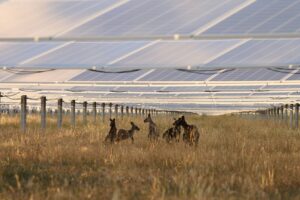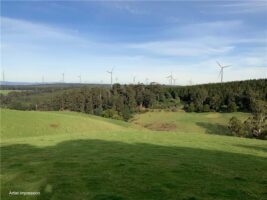The Abbott government has all but set a 2030 emissions reduction target for Australia of 26 per cent based on 2005 emission levels – or possibly 28 per cent, depending on the economics. According to Bloomberg New Energy Finance, the pledge is comparable to the US, Canada, Japan and South Korea in most dimensions, including in that it is not high enough to prevent dangerous climate change.

Here’s more of what BNEF and other experts are saying about the Coalition’s emissions reduction target…
Kobad Bhavnagri, head of Australia for Bloomberg New Energy Finance:
“This shows that the Australian government has judged the politics and nominated a headline target that is right in the middle of the pack with its trading partners. However Australia, like most countries, is still not doing enough to keep the projected rise in global temperature below 2 degrees.
“The long life of our existing coal-fired generators means that with current policies, power sector emission fall by only 9 per cent by 2030 compared to 2014. The reality is that if Australia desires a reduction in domestic reductions, the country must institute policies that reduce coal-fired power and boost renewables. If that doesn’t occur, Australia will have to consider a mechanism to purchase emissions reduction permits from other nations.”
John Connor, CEO The Climate Institute:
“The initial target offer ahead of the Paris climate negotiations in December is a core test of the government’s climate and economic credibility. This target fails tests both of scientific credibility and economic responsibility in a world increasingly focused on modernising and cleaning up energy as well as economic systems.”
“The government can’t pretend that this target would see us doing our bit in limiting warming to less than 2°C. The maximum amount of pollution Australia can emit to 2050 to do its part in avoiding 2°C is around 8-9 billion tonnes. The proposed target would see this limit breached in just 14 years’ time, by 2029.
“If other countries took the same approach as the government announced today, the world would warm by 3-4°C.”
“The government’s weak target is also bad for the economy. As many other nations continue to step up actions to limit emissions and modernise their economies through clean energy and other investments, this target implies that Australia will be the most pollution intensive developed economy by 2030.”
Professor Steven Sherwood, director of the Climate Change Research Centre at UNSW:
“Though it could have been worse, a 26 per cent target is about half of what is really needed, and is weak enough to reinforce Australia’s new reputation as the world’s foot-dragger. Global warming poses a much more serious risk to our future economy than conservation or alternative energy would, so that excuse makes absolutely no sense.”
Associate Professor Frank Jotzo, director of the Centre for Climate Economics and Policy, Crawford School of Public Policy, ANU:
“Australia’s target for reduction in absolute emissions is significantly weaker than that of the United States and the EU, weaker than Canada’s, and on par with Japan’s. The choice of 2005 makes Australia’s target look better than under other base years. When comparing the targeted 2030 emissions level to emissions in the year 2000 or 2012, Australia’s target is much weaker than that of the comparator countries.
“In per capita terms, Australia’s emissions are the highest among all major countries, and this would continue under the announced target. At 2030, emissions per person in Australia would be double the levels targeted in the EU and Japan, and higher than the targeted levels in the United States and Canada.
“Part of the reason is emissions intensive production of commodities for export, but in this field as in many others Australia has good opportunities for cutting emissions by improving technologies and modernizing the economy.”
Hugh Grossman, executive director, RepuTex:
“We currently project that the government’s $2.55bn Emissions Reduction Fund will be fully eroded by next year, while emissions baselines proposed to be set under the government’s Safeguard Mechanism are set too high to have any impact.
“We project covered companies are likely to grow their emissions by around 20 per cent over the next decade under the government’s safeguard scheme – so current policy will fail to even curb emissions growth – let alone reduce emissions to meet the new target.
“The government has a significant policy gap to fill in terms of how it will address forecast emissions growth.”
Tony de Brum, minister of foreign affairs of the Republic of the Marshall Islands:
“As with Prime Minister Abbott’s attempt to ignore climate change when hosting the G20 last year, this will send a serious shudder through the Pacific and raise concern amongst its closest allies, including the United States and Europe.
“This seems to be another example of Australian exceptionalism when it comes to tackling the biggest economic, environmental and security challenge of the 21st Century. …It’s very difficult to understand why a sun-drenched Australia needs five years more than the United States to achieve a 26 to 28 per cent emissions reduction.
“Delaying the necessary cuts just makes things harder and more expensive. It’s disappointing that the Australian Government can’t see beyond the smoke stacks of the past to the clean, green energy future that the rest of the world is embracing.
“The Marshall Islands submitted its own ambitious target last month. The big emitters will have to re-examine their ambitions if Paris is to be a success.”
Adjunct Professor Alan Pears, senior lecturer in global, urban and social studies at RMIT University:
“The government’s assumption that setting a globally responsible, stronger target will damage the Australian economy is deeply flawed. As expert groups like the International Energy Agency and IPCC have pointed out, there is substantial negative cost (ie profitable) abatement potential available, much of it through energy efficiency improvement and innovation.
“At the same time, as noted by Prof Ross Garnaut and Dr Frank Jotzo, the cost of many abatement measures, such as renewable energy, has declined much faster than expected, and will continue to fall through economies of scale and ‘learning by doing’ if we support them. …We can now see that trying to prop up our fossil fuel industries while global demand for them falls is a false economy that undermines our overall economic future.”
Emma Herd, CEO the Investor Group on Climate Change:
“The key question for investors is whether Australia’s target will deliver a credible signal for capital in managing the transition to a low carbon economy. We are concerned that a target of 26 per cent by 2030 from a 2005 baseline will not deliver the certainty that investors are looking for.
“Australia needs an emissions reduction target which puts us on a pathway to our current commitment to limit global warming to 2°C and establishes Australia as a preferred destination for low-carbon investment. Shallow targets which delay effective action will exacerbate investment risks and increase costs. With the right policy framework, investors will make the long term, low carbon investment allocations needed to tackle climate change and ensure Australia’s ongoing competitiveness.”








